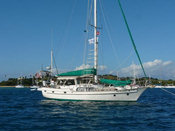Tackless II's Home Page & Website
Women & Cruising Website
Jimmy Cornell's Noonsite
Seven Seas Cruising Association
Fiji's Weather Site Victoria University's S. Pacific Weather Site Fijian History Palmlea Lodge and Bures Nukubati Resort Musket Cove Vuda Point Marina First Landing Resort About Vanuatu About New Caledonia
6 June 2007 – Moving On Up the Coast
5 June 2007 – The 2Cs Go to School…and to Tea!
04 June 2007 – The 2Cs Go To Church
2 June 2007 – Navigating to Navigiri
31 May 2007 -- Bula from Bua
May 30, 2007 -- Waiting Out Weather at Lesiaceva P...
28 May 2007 -- Bye Bye Savusavu
25 May 2007 – Still in Savusavu
15 May 2007 – Road Trip to Palmlea Farms
Nuqumu is one of three villages on the shores of Nukubati Bay and is the home village for Salote and Rajeli. Set on level lawn in the midst of coconuts and breadfruit trees, the small houses were more squarely aligned around the church and a playing field than they had been in hilly Naviquiri.
Nuqumu's church, also Methodist, was much smaller than the one we'd attended the previous Sunday, and from the outside it appeared so decrepit as to give us pause over the addition of four large-sized foreigners! Inside, however, was charming if a bit shabby. To my surprise, I realized that despite being a closed-in building, its underlying shape was the eight-sided lozenge of Samoan fales. Equally surprising were the tall windows all around, which had actual glass in sashes that stood open like French doors to the breeze and rustle of the trees. The walls were a soothing blue, with the altar and pulpit dressed out in lavender satin and lace, and these were topped by three flower arrangements (that may well have been plastic!) The pews were old and handmade, if not actually hand-hewn, with tall backs and narrow benches. The five rowssqueezed in on the left, as last week, were packed with kids, but this time the pews on the right were given over to the choir. This left two banks of five pews each in the main nave for the balance of the congregation…of which there were about ten people until our party of six arrived!
We were late, about twenty minutes after the "bell" (drum beat) for the ten o'clock service, and had to wait for a prayer to finish to slip into our seats -- front row, of course, for the honored guests! Despite our tardiness, shortly after our arrival, a handsome young man in the choir (Rajeli's brother, we later learned) stood up and made us a formal speech of welcome in English. And that, except for the collection, was about it for anything we visitors could understand. Fortunately, this service was shorter than the Naviqiri one (shortened further by our late arrival), and, while the choir did its best, its smaller number made for a less vigorous performance. The highlight of the service for us came at the end, when the children, being dismissed, came each and every one to shake our hands!
Back at the resort we met the friends that had waylaid Jenny. Like Jenny, James and his wife Pearlie, divide their time between Australia and this part of Fiji, and, again like Jenny, James, grew up in this area. The difference is that James is almost the last trustee of his Scottish great-grandfather's estate which contains over a thousand acres of copra plantations in this part of Vanua Levu. Copra is the dried meat of the coconut, which in the past was in high demand for many oils and products, and the copra industry was once the economic mainstay of many tropical nations. Copra fell out of favor when substitutes were found with less cholesterol and saturated fat, and thereby the financial underpinnings of many island peoples went down the drain. We've seen the impact over and over in our travels, for example the Kuna Indians of Panama's San Blas Islands or the Marquesans in French Polynesia, where many landowners we met were cutting down their coconut trees and putting in Nonni. (Nonni is a tree which produces a fruit that appears to have some great health benefits when fermented. Here in Fiji, Nonni is called Kura, and we are taking a dose of it every morning. It tastes horrid!)
A new wind is blowing through the coconut plantations, however. Research has revealed that the historic way of extracting coconut oil – where the oil from pressed coconut is allowed to naturally separate – as opposed to the technological system of heating it that overtook the old way – actually produces a better product. Now known as "virgin coconut oil", it may in fact be the most healthful oil of all! New interest is also burgeoning in coconut as a crop for biofuels as well as for virgin coconut oil, and entrepreneurs are setting up plants here to produce it. The problem is that many old plantations, like the ones in James' family, have been neglected in recent generations, and the task of overhauling things and restoring them to productive status is monumental.
So James and Pearlie are here trying to get a grip on things, and they invited us to come visit.
This e-mail was delivered via satellite phone using GMN's XGate software.
Please be kind and keep your replies short.
Labels: Fiji 2007, Vanua Levu Circumnavigation
or Posts by Topic links in the upper left!
For our Australia posts starting in late 2008 see
Australia Blog
The Blog Template is generated via PsycHo and is Licensed.
